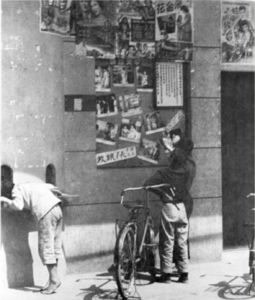1963 Taipei, Taiwan
Tenglin Fang 1951
Taipei, Taiwan
Interviewed on February 8, 2021
by Annie Fang
At a time when television was not widespread and the only entertainment available was the radio, going to the movies was the easiest form of family bonding. The theater that I would always go to was a 10-minute walk away from home, so I would just walk there with my mom and siblings. It was called “MuZha Theater,” and MuZha refers to the district we lived in. The theater is a short gray concrete building that closed when I was about to finish middle school. It wasn’t a big problem when MuZha closed as each district had their own theaters, and many had more than one. From where I lived, there are two more theaters within walking distance in the district and one more that was just a bus ride away. Unlike today, theaters were more like community auditoriums, located out in the open, instead of in department stores.

The box office was outside of the building, so waiting in line to buy tickets in the summer was always a “heated” experience. There are ushers and staff members stationed throughout the theater. My favorite place was naturally the concession, which was located within the screening room. The selection back then was very local: melon seeds, peanuts, Shaomei ice cream. Shaomei was the Häagen-Dazs of our time. Every kid wanted a tub to themselves, and I was no exception. I would always ask for a small serving of the vanilla flavor, which usually only lasted me the beginning of each movie. Popcorn and other western snacks only started appearing when I entered high school. I find it fascinating how the simple, local selection has evolved into popcorn, hotdogs, churros, slushies, and all the fancy foods available today.
I think I started going to the theater when I was six or seven years old, but the first movie I still remember seeing was The Love Eterne (梁山伯與祝英台). It was a Hog Kong-produced historical drama centered around the romance of Liang and Zhu. Zhu disguises as a man to enter the academy and befriends Liang, with whom she slowly falls in love. After she is summoned home for marriage, Liang discovers the truth and also confirms his feelings for her. Seeing that she is already married, Liang dies of grief and longing. At Liang’s grave, Zhu’s overwhelming remorse and love turns the couple into a pair of butterflies that flies off into the sky together. There are two scenes that I still remember vividly. The first is when Liang and his servant are on their way to see Zhu, carrying their books and pens. The second is when the two turn into butterflies. I don’t know why it’s these two scenes specifically, but I suspect it’s because they’re the peaks and lows of the film. Liang’s excitement on his way to see Zhu is indicative of the precious youthful, pure romance that existed between the pair. It’s extremely innocent. When they turn into butterflies, however, that romance is transformed into a stronger, intangible bond that’s yet fleeting and somewhat tragic, too. That I still remember the plot in detail might actually be because The Love Eterne is based on a historical literature masterpiece. It’s a tragedy that everyone knows, and it’s still referenced in popular culture today.
As a kid, I don’t think I really understood most of the films I watched because they were made for adults, centered around topics like romance, war, gangster culture, and more. The experience, for me, was more about going somewhere with my parents and feeling fascinated by the strong visual and audio effects. You’re always engrossed by various forms of cinematic thrill as a kid; it never grows old. However, there were also films made for children. On Children’s Day every year, the Children’s Theater in downtown Taipei offered free entrance for all children. I’ve never been, but I suspect it was really crowded and busy with loud, excited kids.
All of the movies screened in theaters were produced by Taiwan or Hong Kong. By the time I started going to the theater, tensions between Taiwan and China were already extremely high, and all ties had been severed. There wasn’t explicit censorship, but looking back now, anything that may have been politically sensitive to cross-strait relations was certainly cut from the list. Later in high school, foreign films began entering our theaters. I think Jaws and The Guns of Navarone were amongst the first few I saw. Once the Hollywood films started coming in, they stole everyone’s attention. The production quality was just much higher than domestic films, and even today, Hollywood blockbusters are always under the spotlight in local theaters.
